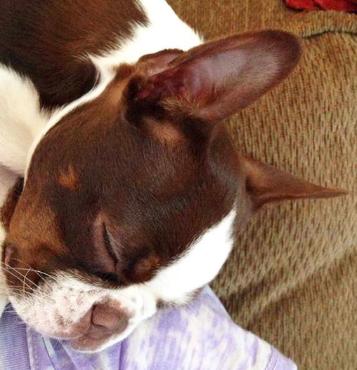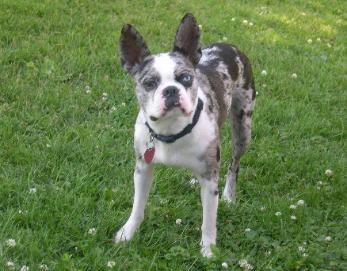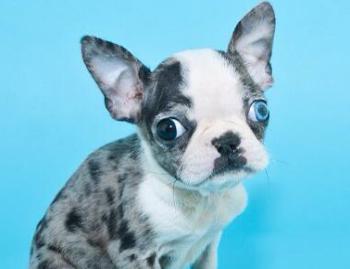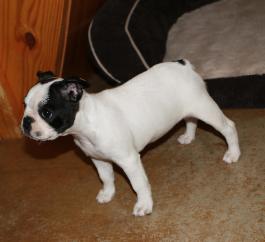| Patterning: White Factoring and Tricolor/Pointed |
| Lesson #8 will be based on the patternings and how white factoring and tricolor Boston Terriers result. |
Boston Terriers with the traditional markings; mask, white collar, white socks, tuxedo saddle-are known as
being patterned with the Irish Spotting Pattern, si. This pattern is recessive to the S allele which is solid,
though it is dominant to the sp pattern, which is responsible for splash marked Boston Terriers. Splash
Boston Terriers are also known as pied Boston Terriers. Splash Boston Terriers can be found in three
categories of splash: mild (more white than your average Boston, maybe extra wide white collar with some
white in the tuxedo along with some odd white designs), moderate (white Boston with color splashes over
the entirety of the coat) and extreme (the Boston is almost entirely white lacking much color splashes at
all). The splash pattern is a able to be seen at birth.
The term white factor is used to describe a Boston Terrier that carries for the sp gene. Not much was
known about genes responsible for spotting until 2007, when the first gene that causes at least some
spotting patterns in dogs was identified and published. The gene identified was MITF, or microphthalmia
associated transcription factor. MITF is a critical gene in the pigmentation pathway. "Another study
presented by Karlsson on behalf of the Broad Institute and the Univerisity in Uppsala, Sweden focused
primarily on Boxers. They have shown that MITF is the gene causing the solid, flashy, and virtually white
forms in Boxers and Bull Terriers. They suggest that two mutations in the promoter region of the MITF form
that works in the pigmenation pathway (MITF-M) are necessary for white in these breeds. One of these is
called a SINE (short interspersed nucleotide element) and the other is a string of repeated alleles that
varies in length in different spotted dogs, which they call a "Length Polymorphism or LP". Their data
suggest that the LP is found to be longer in breeds with white markings than in dogs with no white."
(Schmutz) With that a test is now available for white factoring or the spotting gene.
As there was no way to be certain until recently that your Boston Terrier may carry for white factoring a
theory was developed as a way to be able to judge with the naked eye if your Boston Terrier may carry for
white factoring. The theory went as follows: if the white on the inside of the rear legs goes up the inner leg
and connects with the belly your Boston Terrier likely carries for white factoring. Of course this was not a
fail proof method as there have been splash Bostons produced from sires and dams who do not have any
white on their rear legs.
being patterned with the Irish Spotting Pattern, si. This pattern is recessive to the S allele which is solid,
though it is dominant to the sp pattern, which is responsible for splash marked Boston Terriers. Splash
Boston Terriers are also known as pied Boston Terriers. Splash Boston Terriers can be found in three
categories of splash: mild (more white than your average Boston, maybe extra wide white collar with some
white in the tuxedo along with some odd white designs), moderate (white Boston with color splashes over
the entirety of the coat) and extreme (the Boston is almost entirely white lacking much color splashes at
all). The splash pattern is a able to be seen at birth.
The term white factor is used to describe a Boston Terrier that carries for the sp gene. Not much was
known about genes responsible for spotting until 2007, when the first gene that causes at least some
spotting patterns in dogs was identified and published. The gene identified was MITF, or microphthalmia
associated transcription factor. MITF is a critical gene in the pigmentation pathway. "Another study
presented by Karlsson on behalf of the Broad Institute and the Univerisity in Uppsala, Sweden focused
primarily on Boxers. They have shown that MITF is the gene causing the solid, flashy, and virtually white
forms in Boxers and Bull Terriers. They suggest that two mutations in the promoter region of the MITF form
that works in the pigmenation pathway (MITF-M) are necessary for white in these breeds. One of these is
called a SINE (short interspersed nucleotide element) and the other is a string of repeated alleles that
varies in length in different spotted dogs, which they call a "Length Polymorphism or LP". Their data
suggest that the LP is found to be longer in breeds with white markings than in dogs with no white."
(Schmutz) With that a test is now available for white factoring or the spotting gene.
As there was no way to be certain until recently that your Boston Terrier may carry for white factoring a
theory was developed as a way to be able to judge with the naked eye if your Boston Terrier may carry for
white factoring. The theory went as follows: if the white on the inside of the rear legs goes up the inner leg
and connects with the belly your Boston Terrier likely carries for white factoring. Of course this was not a
fail proof method as there have been splash Bostons produced from sires and dams who do not have any
white on their rear legs.
| Splash Genetically Known As: sp |


Tricolor Boston Terriers, also known as pointed, are by far the hardest to come by pattern of all those Boston
Terrier. Boston Terriers with points are known to be possible in purebred Bostons because old standards for
shows dating back before the turn of the 20th century, when the Boston Terrier was still being developed, were
listed within the standard as a disqualification. The fact that they were listed proved that they did exist at one
time within the breed and that certain lines do carry recessively for tricolor. Because these lines are limited, the
chances of producing them within a litter are very small.
Tricolor Boston Terriers are distinguished by their pointed eye brows, cheeks, and coloring dividing the socks
and the color on the legs. There have been a very small number of documented tricolor Boston Terriers to date,
two brown, rust, and white female and one black, rust, and white female, all being from different breeders in
which none of the sires and dams of said tricolor Bostons were directly related. Documentation of two of these
Boston Terriers suggests that they were not born tricolor, but developed the points at an older age.
Terrier. Boston Terriers with points are known to be possible in purebred Bostons because old standards for
shows dating back before the turn of the 20th century, when the Boston Terrier was still being developed, were
listed within the standard as a disqualification. The fact that they were listed proved that they did exist at one
time within the breed and that certain lines do carry recessively for tricolor. Because these lines are limited, the
chances of producing them within a litter are very small.
Tricolor Boston Terriers are distinguished by their pointed eye brows, cheeks, and coloring dividing the socks
and the color on the legs. There have been a very small number of documented tricolor Boston Terriers to date,
two brown, rust, and white female and one black, rust, and white female, all being from different breeders in
which none of the sires and dams of said tricolor Bostons were directly related. Documentation of two of these
Boston Terriers suggests that they were not born tricolor, but developed the points at an older age.
| Tri-Color Genetically Known As: atat |
- It has been stated that Boston Terriers with a predominance of white have a higher incidence of being
deaf. This was stated with no scientific evidence. Of all the splash Boston Terriers that have been BAER
tested and results shared with the public for documentation by Cypress Farm (13 total), not one has come
back as being deaf, bilaterally nor unilaterally. It is possible that Boston Terriers with lack of pigmentation
within the inner ear canal may have a higher incidence of deafness as reported through research,
however, any color Boston Terrier of any pattern can have this.
- Health issues associated with the merle gene are extensive and include but are not limited to: issues with
hearing, skin/coat, lethal white (causes death of puppies early on). Please do extensive research when
considering merle Boston mixes.
-TriColor Boston Terriers have been purebred and part of the breed since the conception of the Boston
Terrier in the late 1860's. This is not to say that there are not unscrupulous breeders of today that would
mixbreed to create the pattern for the sake of profit. There are many breed books that speak about Black
and Tan Boston Terriers (having white markings) being used for foundational breeding. Some of the first
Boston Terrier standards in history even disqualify Black and Tan color/markings. The breed standard
would not DQ something that does not exist, thus proving the legitimacy of the purebred existence of the
pattern in the history of the breed. Even today there are Boston Terriers who carry the genes to produce
tan/rust points, some even ranking at the highest levels in AKC conformation title. Only a DNA coat color
testing panel would exclude or confirm the recessives that certain Boston Terriers carry. Without
concluding this testing, an owner can not exclaim that their dog does not possess these recessives. This
applies to all purebred coat colors known to be within the genetics of the Boston Terrier.
deaf. This was stated with no scientific evidence. Of all the splash Boston Terriers that have been BAER
tested and results shared with the public for documentation by Cypress Farm (13 total), not one has come
back as being deaf, bilaterally nor unilaterally. It is possible that Boston Terriers with lack of pigmentation
within the inner ear canal may have a higher incidence of deafness as reported through research,
however, any color Boston Terrier of any pattern can have this.
- Health issues associated with the merle gene are extensive and include but are not limited to: issues with
hearing, skin/coat, lethal white (causes death of puppies early on). Please do extensive research when
considering merle Boston mixes.
-TriColor Boston Terriers have been purebred and part of the breed since the conception of the Boston
Terrier in the late 1860's. This is not to say that there are not unscrupulous breeders of today that would
mixbreed to create the pattern for the sake of profit. There are many breed books that speak about Black
and Tan Boston Terriers (having white markings) being used for foundational breeding. Some of the first
Boston Terrier standards in history even disqualify Black and Tan color/markings. The breed standard
would not DQ something that does not exist, thus proving the legitimacy of the purebred existence of the
pattern in the history of the breed. Even today there are Boston Terriers who carry the genes to produce
tan/rust points, some even ranking at the highest levels in AKC conformation title. Only a DNA coat color
testing panel would exclude or confirm the recessives that certain Boston Terriers carry. Without
concluding this testing, an owner can not exclaim that their dog does not possess these recessives. This
applies to all purebred coat colors known to be within the genetics of the Boston Terrier.
| ***Important Facts To Note Splash/TriColor Boston Terriers*** |
| I am ready to move onto Lesson #9: Blue Eyes/Mismarks Please Take Me To Lesson #9 Please Take Me To Color Home |



| Special thanks to our friends at Cherry Run Boston Babies for letting us use the images of her chocolate tri "Rayna". |
Merle is a canine coat color pattern that is naturally occurring to only a few breeds. This means that in a majority of
breeds this color does not exist unless the dog is a mixbreed. MERLE BOSTON TERRIERS OF PURITY DO NOT EXIST.
Yes, it is possible to breed a Boston Terrier Mix dog that has merle pattern coloration. However it is impossible to
have an AKC registered and defined "purebred" merle Boston Terrier. There is no mention of merle (or harlequin)
coloration in any historical or modern day Boston Terrier articles. This a newly developing fad color for the breed due
to profit seeking breeders. It would be hypocritical for us at Cypress Farm to claim that breeding any color of dog is
unfit, since we ourselves raise Boston Terriers who's coat colors are against AKC standard even if the colors that we
produce are found in BT history, documented, and purebred. However the issue I have personally with people
breeding merle mixes of any breeds is that they are doing so irresponsibly. I have yet to find a breeder who is
focusing on merle in their Boston Terrier programs that do minimal health testing, let alone the Boston Terrier OFA
specific health tests. When breeding for merle, the color is beautiful, but it needs to be understood the health issues
that are scientifically linked to the merle genetics. Also needing to be kept in mind is the health issues associated
with all the breeds used to create a merle colored Boston Terrier mix. If a breeder isn't going to take the time to
complete all of the OFA breed specific health tests for all the breeds they are using to create the Boston Terrier mix
of merle coloration, and if the breeder advertises/publisizes the truth of how the coloration is achieved, then we at
Cypress Farm have no complaint that could be validated. This is not happening at this time. Families who wish to add
a merle Boston Terrier mix to their family should be educated and understand the cost of the puppy. Is your family
paying highest dollar for a puppy that is mix bred and in less than acceptable health condition from parents who have
had no health testing whatsoever from a breeder who isn't the least best educated in the genetics they are dabbing
in because you selfishly put your value for coat coloration over your value for health? Don't be a fool.
breeds this color does not exist unless the dog is a mixbreed. MERLE BOSTON TERRIERS OF PURITY DO NOT EXIST.
Yes, it is possible to breed a Boston Terrier Mix dog that has merle pattern coloration. However it is impossible to
have an AKC registered and defined "purebred" merle Boston Terrier. There is no mention of merle (or harlequin)
coloration in any historical or modern day Boston Terrier articles. This a newly developing fad color for the breed due
to profit seeking breeders. It would be hypocritical for us at Cypress Farm to claim that breeding any color of dog is
unfit, since we ourselves raise Boston Terriers who's coat colors are against AKC standard even if the colors that we
produce are found in BT history, documented, and purebred. However the issue I have personally with people
breeding merle mixes of any breeds is that they are doing so irresponsibly. I have yet to find a breeder who is
focusing on merle in their Boston Terrier programs that do minimal health testing, let alone the Boston Terrier OFA
specific health tests. When breeding for merle, the color is beautiful, but it needs to be understood the health issues
that are scientifically linked to the merle genetics. Also needing to be kept in mind is the health issues associated
with all the breeds used to create a merle colored Boston Terrier mix. If a breeder isn't going to take the time to
complete all of the OFA breed specific health tests for all the breeds they are using to create the Boston Terrier mix
of merle coloration, and if the breeder advertises/publisizes the truth of how the coloration is achieved, then we at
Cypress Farm have no complaint that could be validated. This is not happening at this time. Families who wish to add
a merle Boston Terrier mix to their family should be educated and understand the cost of the puppy. Is your family
paying highest dollar for a puppy that is mix bred and in less than acceptable health condition from parents who have
had no health testing whatsoever from a breeder who isn't the least best educated in the genetics they are dabbing
in because you selfishly put your value for coat coloration over your value for health? Don't be a fool.
| MERLE |



| Cypress Farm Kennel does NOT raise merle mixbreeds. These are photos found on a GOOGLE search. |
